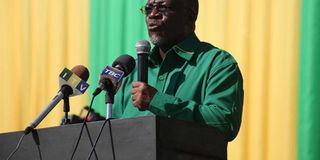Next president of Tanzania has the big job of rousing Africa’s sleeping giant

Chama Cha Mapinduzi (CCM) Presidential candidate John Magufuli delivers a speech during a political rally on July 14, 2015 in Dar es Salaam, ahead presidential election which will be held in October 2015. PHOTO | EMILE COSTARD |
What you need to know:
- It is not in doubt that our neighbours are grossly under performing: should the next leader have the vision and gravitas it would be a country to watch.
Tanzania works in mysterious ways. According to all the opinion polls, former Prime Minister Edward Lowassa was by a wide margin the most popular candidate in the crowded field of aspirants seeking to replace Jakaya Kikwete in State House.
But the hierarchy of the Chama Cha Mapinduzi party, which has held power since independence, had other ideas.
In a process every bit as foggy as the conclave of cardinals that selects the Pope, a powerful committee of the party sat and shortlisted five candidates from who delegates would pick a candidate.
Lowassa was not one of them.
There are many debates about the merits and demerits of having a strong and dominant political party in a country. The obvious advantage, which CCM has given Tanzania, is stability. The disadvantage is that an all-powerful party can stifle creativity and competition. It can create a club of leaders who, lacking the insecurity which comes with a strong opposition credibly threatening to take power at the next elections, become complacent and don’t push themselves to achieve better things.
The CCM candidate John Magufuli will face off against opposition leader Wilbrod Slaa although it is unclear whether Lowassa will seek to attain office as an independent candidate.
The new president will have a big job on their hands. With a friend, I recently embarked on a nearly 3,000 kilometre drive through rural Tanzania travelling from Nairobi through Migori and on to Shinyanga and ending up in a magical town called Kigoma by the shores of Lake Tanganyika. Mji wenye hewa safi (the town with perfect weather) as the musicians call it.
We took a different route back, cutting through Tabora and down to Singida and emerging into Kenya through Namanga via Arusha.
BIGGEST GIFT
You learn so much more about a country when you drive through it rather than parachuting into the big cities. But what we learnt was not too surprising.
There are things to admire about Tanzania. The neighbours are calmer and less harried than Kenyans who seem permanently stressed by the aggressive cut and thrust of the big cities. But the weaknesses of Tanzania are also obvious. Put simply, the country is one of Africa’s great underperformers.
Its store of natural resources has few peers in the region. They have gold and silver, diamond and gas in plentiful supply.
Their biggest gift is land. Tanzania is bigger than Nigeria and has less than half its population. Out of the 44 million hectares of its available arable land area, only around 23 per cent is under cultivation. The application of mechanised agriculture could easily turn the country into the bread basket of Africa.
What holds the country back? The CCM has failed to comprehensively abandon the failed policies of the past and modernise. Unlike the Chinese Communist party, which realised that Chairman Mao’s approach had totally failed and quietly engineered an about-turn under Deng Xiaoping, CCM has not found a leader with a similar vision and gravitas.
Policies such as collective ownership of land, which means that farmers cannot use titles as collateral, no longer make sense. Nor does the insistence by some within CCM on the primacy of Kiswahili as the key medium of instruction.
Tanzania needs a leader who can make the country competitive and improve the fortunes of the children going through the school system while avoiding the worst elements of Kenyan society including its ethnic divisions and steep inequality.
On the drive into the neighbouring country, you could see a stark difference between the economic fortunes of border towns.
Migori on the Kenyan side is clearly booming under devolution with new hotels springing up and economic activity going on late into the night. Kisii will soon be a major city.
But once we drove into Tanzania, the contrast could not be starker with people still living in modest huts and leading a peaceful but largely underdeveloped life.
Tanzania should change while preserving the good things about it. It seems most in the country supported Lowassa because despite the corruption claims that have dogged him, he was seen as a strong and effective leader who could chart a new path.
Now the choice will be between Slaa and Magufuli with the CCM candidate starting as favourite. Whoever wins should have the ambition to lead Tanzania in a new direction and help it fulfil its potential.
[email protected]; Twitter: @mutigam





